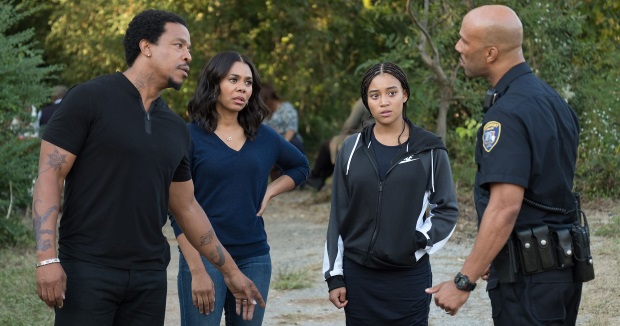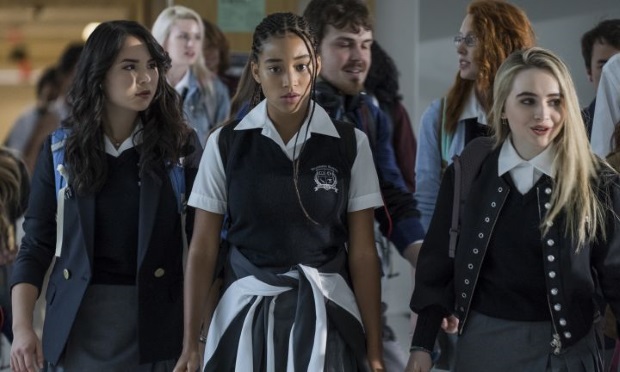The Hate U Give: Differences Between the Book and the Movie
Charting how The Hate U Give book differs from the movie - changes to characters, a different ending and more.

This article comes from Den of Geek UK.
Massive spoilers for the book and film lie ahead…
Film adaptations of books almost always differ from the source material to some extent – they’re two different types of storytelling if nothing else. Angie Thomas’ powerful YA novel The Hate U Give follows African American teenager Starr, who lives in the hard up and predominantly black neighborhood of Garden Heights, while struggling to keep her identity at the posh and predominantly white high school she attends. When she witnesses a police shooting Starr has to find her own voice, and deal with the costs of speaking out.
The film, directed by George Tillman Jr., is out now; it’s a powerful adaptation which stays true to the heart of the book. However, there are some significant changes and omissions there too. Here are all the ways the movie differs from the book.
Chris
The character of Starr’s boyfriend is roundly the same but the argument post- the condom thing is prolonged in the book. The slightly uncomfortable ‘I don’t see color’ speech in the film isn’t in the book either, though he does express a similar sentiment towards the end of the novel. When Starr and Seven question him about food in the book it’s green bean casserole, while in the film it’s sweet potato pie versus pumpkin pie. It’s still the merits and properties of macaroni cheese they ultimately disagree on in both the book and the film.
Mr Lewis
In the novel, Mr Lewis is the grouchy owner of the Barbershop next to the store that Starr’s dad Maverick owns. He’s not a big part in the film, though he notices Starr and Seven are in the store when it’s on fire. In the book he has a more significant role. After Khalil is killed there are various protests in Garden Heights; this includes an attack on a police car which Mr Lewis says he witnesses. Lewis speaks to a news crew live on TV and specifically identifies King as a drug dealer, and the King Lords as a violent gang. Lewis calls out Maverick, who used to be a King Lord, for sticking to stupid rules about not snitching and for teaching his kids to do the same. He shows him the prosthetic leg he has after losing a leg in the war and a scar he has after being cut by some white guys for drinking from ‘their’ fountain. It’s this argument that causes the police to wrestle Mav to the ground in front of his children and identify that Starr was the witness to Khalil’s murder (and not a row with King, as was the catalyst in the movie). Lewis is later beaten up by King’s gang. At the end Mr Lewis gives Mav his shop after that and Mav’s store are burned down; his only stipulation is that Mav puts a picture of Martin Luther King in there.
DeVante
In the film DeVante appears only very briefly – he’s the guy at the party at the start chatting up a girl called Denasia, who Starr’s friend Kenya wants to beat up. In the book though, DeVante is a key part of the plot. It turns out DeVante is a King Lord too. At the party at the start of the story Starr and Khalil leave because they hear shots – it turns out those shots were fired by rival gang the Garden Disciples and they result in the death of DeVante’s brother Dalvin. King wants DeVante to carry out a retaliation attack. DeVante steals thousands of dollars from King to pay for his mother and family to leave town (because if he gets into a revenge war with the Garden Disciples it puts his family in danger). DeVante then decides not to retaliate but his mother puts him out of the house anyway. DeVante is hiding from King in Mav’s store and Mav decides to protect him. DeVante works in Mav’s store and is taken to live with Uncle Carlos. It’s DeVante who’s beaten up by King (in the movie it’s Seven), and he’s with Seven, Starr and Chris at the protests and agrees to be a witness against King at the end.
Uncle Carlos
Cop Carlos appears in the film – played by Common (perfect casting). In the book he’s a bigger part and an influence on Starr. Carlos is very close to Starr, having spent a lot of time with her while Mav was in prison. Carlos puts up DeVante and there’s a sense that he’s helping DeVante because he feels like he let Khalil down. Various members of Starr’s family stay with him – Sekani’s bike lives at Carlos’ house because it’s not safe to ride in Garden Heights. Carlos also lives close to Starr’s boyfriend Chris, so Carlos and his wife know about the relationship while Mav does not. The conversation between Starr and Carlos about when police shoot and when they say ‘put up your hands’ isn’t quite the same in the book. In the book Carlos concludes that he wouldn’t have shot Khalil.

The police
Unsurprisingly the film is slightly more diplomatic in how the police are portrayed, and the riots are a little more PG-13. In the film Starr and her friends don’t repeatedly chant ‘fuck the police’ as they do in the book, for example…
King
Perhaps it’s the casting of lovely Anthony Mackie in the role of King in the film, but this character is also more sympathetically portrayed. King in the book is vile, gross, and abusive. He’s essentially a pimp to Iesha – in the film Mav slept with Iesha and got her pregnant with Seven when Mav and Lisa had broken up. In the film Mav sleeps with Iesha after a row with Lisa because King basically treats her as a prostitute. King beats Iesha, Lewis and DeVante and threatens Mav and Starr. In the movie he’s mildly redeemable at the start. Not in the book.
Hailee and Maya
Starr’s Williamson friends have a bigger role in the book than the movie. Their roles are similar, though in the book Maya is explicitly Asian-American and Hailee has also made racist remarks towards her. Hailee is racist in both and at the end of the book Starr texts her essentially ending their friendship.

Khalil, drugs, and his mom
Khalil is also perfectly cast in the film, embodied by the highly charismatic Algee Smith. In the film Starr and Khalil kiss on the night of his death, in the book there’s sexual tension but they don’t kiss. Starr knows that Khalil is a drug dealer in both, but in the book his reasons for selling drugs and involvement with the King Lords isn’t revealed to Starr (or us) until later in the narrative. Khalil’s mother is an addict and his grandmother has cancer. Khalil’s mother is in debt to King so Khalil’s is dealing to try to protect her. King tries to recruit Khalil into the King Lords but Khalil refuses. At the funeral in the book, King lays a gray bandana on Khalil’s corpse claiming him as part of his gang, but Starr later finds out this is just for show.
The ending
One of the biggest changes from the book is the ending. In the movie a stand-off between King, Mav and the police, after King has set fire to Maverick’s store, escalates when little Sekani takes Maverick’s gun and points it at King. Are the police really going to shoot a little child? Is King? Is Sekani really going to shoot King? It’s a tense ending, if a bit literal about the ‘little infants’ element of the ‘Thug Life’ meaning that the title is derived from (‘The Hate U Give Little Infants Fucks Everyone’). Sekani does not get shot and does not shoot King and the police are able to arrest King for arson. In the book King and his gang are hanging around after the fire laughing about it. When the police and fire brigade show up Mr Lewis tells them King set the fire, but he denies it. Maverick decides to speak up too and says King did it, and the rest of the community back him up and say they saw King light the fire. King is arrested but the family knows he’s likely to get out on bail after a short time and come for revenge. Instead though, DeVante agrees to disclose where King’s stash of drugs is and work with Uncle Carlos as a police witness to get him put away for a long time. Carlos offers him protection. Mr Lewis gives Mav his store and Mav agrees to rebuild it, and bring something positive to their community.
Read and download the Den of Geek NYCC 2018 Special Edition Magazine right here!
